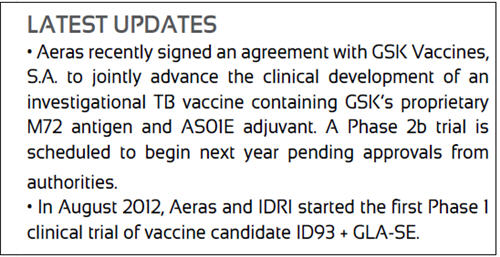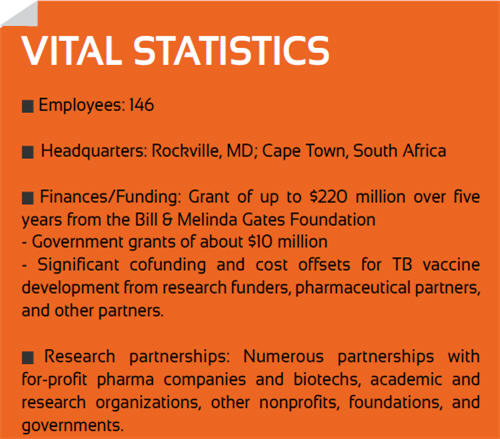Companies To Watch: Aeras
By Wayne Koberstein, Executive Editor, Life Science Leader
Follow Me On Twitter @WayneKoberstein
SNAPSHOT
Aeras (www.aeras.org) is a not-for-profit enterprise developing next-generation TB vaccines. It has a pipeline of vaccine candidates in preclinical, Phase 1, and Phase 2 development and partnerships with small and large companies, government and academic institutions, and nongovernmental organizations (NGOs). It aims to have a vaccine available worldwide in less than 10 years and ultimately protect people from infection, transmission, onset, and recurrence of the most severe forms of the disease.

WHAT’S AT STAKE
Although other companies and institutions are working on pieces of the TB challenge, and some have vaccine candidates in their pipeline, Aeras is the only player organized solely around the vaccine goal with integrated development and manufacturing functions all operating in a single organization. “We have the ability to take the innovative discoveries by academic scientists and other entities — drug candidates that might not otherwise move forward without our support — and facilitate their development and testing,” says Aeras President & CEO Jim Connolly. “We’re not looking ultimately for shareholder return or paying back investors in the classic sense; as a result, we are able to take more risks and form more flexible and nontraditional alliances than for-profit companies.” Aside from its not-for-profit status, Aeras is a real company in every respect. It has six vaccine candidates in its clinical pipeline and is testing various vaccine platforms and TB antigens. It has built a $30 million production facility sufficient to supply its clinical trials and then some. And it is tackling the scientific challenge of developing the first vaccine effective in adults and against pulmonary TB. The clinical trials will determine which vaccine candidate or candidates survive. Part of the challenge is the lack of preclinical models and predictive assays to test any vaccine for this disease. “To test a TB vaccine to determine whether it is protective requires relatively large Phase 2b trials that can cost up to $30 to $40 million apiece,” says Connolly. “We are fortunate to receive funding from donors and partners like the Gates Foundation, Wellcome Trust, and the U.S., United Kingdom, and Dutch governments, among others to help support our activities, but more will be needed as we progress into later-stage trials.”
None of this is cheap or easy, and it will take other companies, governments, and NGOs working as partners with Aeras to pull it off. Inevitably, the vaccine will bridge the nonprofit and commercial realms. In fact, Aeras is already in partnership with several pharma/biopharma companies. However, Aeras will insist on wide access and “affordability” for any vaccine in distribution through partners. That limits but does not take away the financial incentives for such companies, according to Connolly. “TB affects the developing world, but it is also present in emerging markets like China and India, where higher price levels could be supported, as well as North America, Europe, and other commercial markets,” says Connolly. The Aeras vaccine manufacturing facility and capabilities are able to support its work to develop TB vaccines as well as the efforts of others developing vaccines for neglected diseases. “We have been using the facility for our development work but it is still underutilized, so we are now looking to partner with more organizations, both not-for-profit and for-profit, particularly on process development and clinical lot manufacturing,” he says. Even given the potential rewards, it is doubtful that any for-profit company could be as dedicated, integrated, and efficient as Aeras in reaching for the goal. Its special status allows it to rally a unique array of forces against a worldwide scourge that gets less attention from the industry’s business side than many rare diseases.

